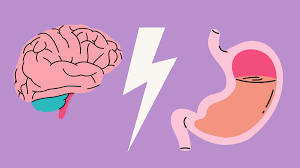Skip to content

Research reveals a significant connection between anxiety and stress, your brain chemistry, and your gut or gastrointestinal tract.
Dr. Jay Pasricha, M.B.B.S., M.D. from John Hopkins explains that hidden in your gut is your second brain and it's hidden within walls of the digestive system. This “brain in your gut” is revolutionizing medicine’s understanding of the links between digestion, mood, health and even the way you think. Scientists call this little brain the enteric nervous system (ENS). And it’s not so little. The ENS is two thin layers of more than 100 million nerve cells lining your gastrointestinal tract from esophagus to rectum.
Have you ever had a "gut-wrenching" experience? Do certain situations make you "feel nauseous"? Have you ever felt "butterflies" in your stomach? We use these expressions for a reason. The gastrointestinal tract is sensitive to emotion. Anger, anxiety, sadness, elation — all of these feelings (and others) can trigger symptoms in the gut.
The brain has a direct effect on the stomach and intestines, like thinking about eating releases enzymes in your mouth and stomach before food even gets there to start the digestion process. This connection goes both ways. A troubled intestine can send signals to the brain, just as a troubled brain can send signals to the gut. Therefore, a person's stomach or intestinal distress can be the cause or the product of anxiety, stress, or depression. That's because the brain and the gastrointestinal (GI) system are intimately connected.
This is especially true in cases where a person experiences gastrointestinal upset with no obvious physical cause. For such functional GI disorders, it is difficult to try to heal a distressed gut without considering the role of stress and emotion.
Gut health and anxiety
Given how closely the gut and brain interact, it becomes easier to understand why you might feel nauseated before giving a presentation, or feel intestinal pain during times of stress. That doesn't mean, however, that functional gastrointestinal conditions are imagined or "all in your head." Psychology combines with physical factors to cause pain and other bowel symptoms. Psychosocial factors influence the actual physiology of the gut, as well as symptoms. In other words, stress (or depression or other psychological factors) can affect movement and contractions of the GI tract.
In addition, many people with functional GI disorders perceive pain more acutely than other people do because their brains are more responsive to pain signals from the GI tract. Stress can make the existing pain seem even worse.
Changing Your Diet May Help With Anxiety
So what can we do? Eat healthier, maintain healthy habits to support your gut like quit smoking, cut down on alcohol consumption, drink more water, add probiotics and prebiotics into your diet. There are a million and one probiotics and prebiotics on the market, what if you just needed to eat one bar that offered 1 billion probiotics and natural prebiotics. It could be the start to a healthier gut and healthier you.
